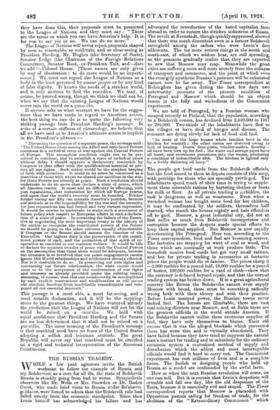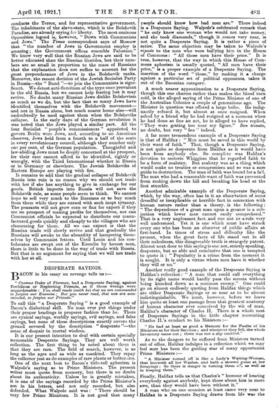THE RUSSIAN TRAGEDY.
UTHILE a few paid agitators invite the British V i' workman to follow the example of Russia and try Bolshevism as a cure for all ills, the state of Bolshevik Russia is steadily going from bad to worse. Sympathetic observers like Mr. Wells or Mrs. Snowden or Dr. Haden Guest, who made brief visits to Russia under Bolshevik guidance, were forced. to admit that the Bolshevik rule had failed utterly from the economic standpoint. Since then Lenin himself has acknowledged. his failure and has advocated the introduction of the hated capitalist from abroad in order to restore the stricken industries of Russia. The revolt at Kronstadt, though quickly suppressed, showed that there was much discontent even in a former Bolshevik stronghold among the sailors who were Lenin's first adherents. The tar more serious risings in the south and south-east, of which we seldom hear, are still spreading, as the peasants gradually realize that they are expected to sow that Moscow may reap. Meanwhile the great cities are suffering more and more acutely from the collapse of transport and commerce, and the point at which even the strangely apathetic Russian's patience will be exhausted cannot now be far away. The Times correspondent at Helsingf ors has given during the last few days two noteworthy accounts of the present condition of Petrograd. and Moscow which should be an object lesson in the folly and wickedness of the Communist experiment.
We are told of Petrograd, by a Russian woman who escaped recently to Finland, that the population, according to a Bolshevik census, has declined from 2,440,000 in 1917 to 705,000. Two-thirds of the inhabitants have fled to the villages or have died of hunger and disease. The remnant are dying slowly for lack of food and fuel.
" In most of the large houses whole families herd in the kitchen for warmth ; the other rooms are deserted owing to lack of heating. Doors, door-poste, window-sashes, flooring— all have been torn up for fuel ; the water and sewage pipes have all burst, and excrement percolates into the rooms, producing a condition of indescribable filth. The kitchen is lighted only by a feebly flickering oil lamp."
The people get food. cards from the Bolshevik officials, but the food issued to them at depots consists of thin soup, with porridge for those who are specially privileged. The inhabitants spend much of their time in tryir g to supple- ment these miserable rations by bartering clothes or boots for milk or flour. As all private trading is icrbidden, the task is dangerous as well as wearisome. Even when a wretched woman has bought some food for her children, it may be confiscated by the soldiers, themselves half starved, who search the houses nightly and hale offenders off to gaol. Moscow, a great industrial city, did not at first suffer so much from Bolshevik incompetence and corruption because the despots made special efforts to keep their capital supplied. But Moscow is now rapidly deteriorating like Petrograd. Here too, according to the Times correspondent, food and fuel are becoming scarcer. The factories are stopping for want of coal or wood, and those which are nominally at work produce little. The townsfolk receive food cards but get very small rations, and but for private trading in necessaries at fantastic prices the people would die of famine. The prices charged —2,000 roubles for a pound loaf, 18,000 roubles for a pound of butter, 100,000 roubles for a yard. of cloth—show that the currency is debased beyond repair, and that the normal trading system has broken down. If in a great agricultural country hie Russia the Bolsheviks cannot even supply Moscow with bread, there must be something radically wrong both with their theory and with their practice. Before Lenin usurped power, the Russian towns never lacked fuel. The forests are illimitable, there are vast coal-mining districts near Moscow, and at Baku there are the greatest oilfields in the world outside America. If the Bolsheviks cannot utilize these enormous supplies of fuel, they have- only themselves to blame. Their old excuse that it was the alleged blockade which prevented them has worn thin and is virtually abandoned. They have failed because they have tried to suppress the natural man's instinct for trading and to substitute for the ordinary economic system a centralized method of supply and distribution which the ablest and most incorruptible officials would find it hard to carry out. The Communist experiment has cost millions of lives and is a complete fiasco. The foolish or designing people who hold up Russia as a model are confounded by the awful facts.
How or when the next Russian revolution will come, no one can tell. But it is certain that Lenin's despotism will crumble and fall one day, like the old despotism of the Tsars, because it is essentially evil and stupid. The Times correspondent reports that Moscow is placarded with Opposition posters calling for freedom of trade, for the abolition of the " Extraordinary Commission " which conducts the Terror, and for representative government. The inhabitants of the slave-state, which is the Bolshevik Paradise, are already crying for liberty. The most ominous Opposition legend is, however, " Down with Communists and Jews." The Times correspondent says of Moscow that " the number of Jews in Government employ is amazing ; the Government offices resemble Palestine." We know very well that the Russian Jews are said to be better educated than the Russian Gentiles, but their num- bers are so small in proportion to the mass of Russians that the explanation does not suffice to account for the great preponderance of Jews in the Bolshevik ranks. Moreover, the recent decision of the Jewish Socialist Party in Russia—the " Bund "—to join the Communists is sigm- ficant. We detest anti-Semitism of the type once prevalent in the old Russia, but we cannot help fearing lest it may revive. No doubt many Russian Jews dislike Bolshevism as much as we do, but the fact that so many Jews have identified themselves with the Bolshevik movement— and not in Russia alone, but much nearer home also—will undoubtedly be used against them when the Bolsheviks collapse. In the early days of the German revolution it was noted that the Jews played a similar part. All the four Socialist " people's commissioners " appointed to govern Berlin were Jews, and, according to an American observer, Jews held from a fourth to a half of the seats in every revolutionary council, although they number only one per cent. of the German population. Thoughtful and law-abiding Jews must be deeply concerned at the prospect, for their race cannot afford to be identified, rightly or wrongly, with the Third International whether in Russia or in Germany or elsewhere. The Jewish Bolsheviks of Eastern Europe are playing with fire. It remains to add that the gradual collapse of Bolshevik Russia into ruin is no reason why we should not trade with her if she has anything to give in exchange for our goods. British imports into Russia will not save the Bolshevik rule, as some people seem to think. We cannot hope to sell very much to the Russians or to buy much from them while they are cursed with such inept tyranny. The peasants will not grow corn or flax for export if they see no prospect of making profits for themselves, nor can Communist officials be expected to distribute our manu- factured goods quickly and cheaply to the villagers who are clamouring for them. All we can expect is that the Russian trade will slowly revive and that gradually the Russians will awake to the absurdity. of hampering them- selves by Communist fetters. Until Lenin and his con- federates are swept out of the Kremlin by honest men, there is little to be done in the way of trade with Russia. But that is no argument for saying that we will not trade with her at all.



































 Previous page
Previous page